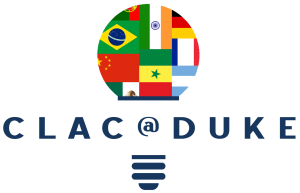
The Cultures and Languages Across the Curriculum (CLAC) program was founded at Duke in 2013. Duke’s language departments offer a wide array of courses that span the arts, humanities, and the professions. The CLAC program expands upon these offerings by embedding innovative programming in Public Policy, Global Health, Environmental Studies, and Marketing. Hallmarks of our program include:
- exploring culturally-specific solutions to real-world issues
- engaging meaningfully with local and/or global populations
- developing strategic discourse competence for subject-specific use
- reflecting critically about how language and culture impact worldview
Duke is actively involved in the CLAC Consortium, which includes over 30 colleges and universities across the United States. The CLAC Consortium’s vision is that multilingual and multicultural perspectives will inform all curricular and co-curricular practices in higher education, that the barriers between language learning and disciplinary learning will dissolve, that all students will have multiple opportunities to meaningfully use languages they know or are learning, and that institutions of higher education will value all languages as a means to access, generate, and disseminate knowledge.
The CLAC Consortium helps faculty identify ways to incorporate diverse languages and cultures across academic disciplines, thereby enhancing the translingual and transcultural competence of their students. Through mentoring, workshops, conferences, and publications, the consortium supports programmatic development and alignment between CLAC and key institutional priorities. The consortium promotes the visibility of CLAC programs and advocates for the adoption of the CLAC framework across higher education.
All CLAC courses are created through an intentional “backward design” methodology. We use a multi-literacies framework that supports critical reflection within a learner-centered classroom. Coursework is based on real-world challenges and whenever possible includes the local community, through guest speakers, shadowing, or site visits.
Course types
There are two kinds of CLAC courses:
- ½ credit tutorials in the departments across campus, including the Duke Global Health Institute, Sanford School of Public Policy, the Markets and Management Certificate program, the Nicholas School of the Environment, Music, and Philosophy. Classes meet once a week for 75 minutes. Satisfactory/Unsatisfactory. Languages offered have included Arabic, French, German, Italian, Hindi, Korean, Mandarin, Portuguese, Russian, Spanish, and Swahili.
- Discussion sections in languages other than English for large lecture courses in the humanities. Classes meet once a week for 75 minutes. Languages have included French, German, Italian, Portuguese, and Spanish.

